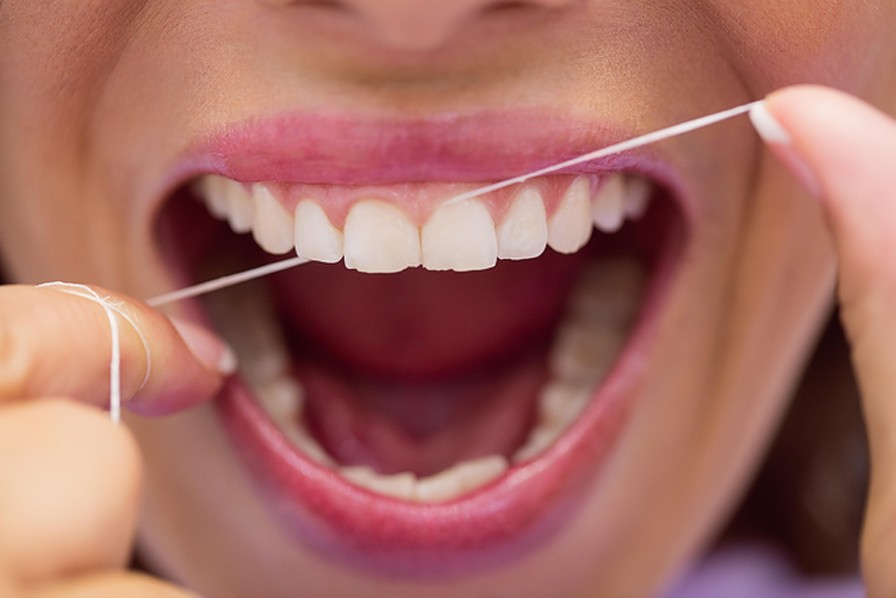Most people don’t think twice before brushing their teeth every day, once in the morning and once at night. From a young age, the importance of brushing your teeth has been ingrained in our brains.
Flossing is a different story.
While it requires a little more effort than brushing, it should be done at least once a day. A lot of people don’t floss regularly due to:
- Sensitive gums: Healthy gums shouldn’t hurt or bleed when they’re flossed. If they do, it’s an indicator you should be flossing more.
- An inability to do it: Flossing your teeth requires more dexterity than brushing does. Young children who lack fine motor skills or older people who suffer from problems like arthritis may find flossing difficult. There are alternatives to regular dental floss, like plastic floss picks, that make flossing realistic for everyone.
- A lack of time: Most people roll their eyes at the thought of maneuvering floss between their teeth. Those with tight and crowded teeth may have to spend a few extra minutes completing this task. The three to five minutes it takes to brush your teeth is well-worth it.
- An ignorance of its impact on their health: Flossing, or refusing to floss, can impact both your oral and bodily health.
This last point is something that our dentists at Vellore Woods Dentistry want you to recognize. Here, we’ll explore a variety of problems that can arise if you don’t floss regularly.
Bleeding Gums
As previously discussed, healthy gums do not bleed.
Plaque is a bacteria-ridden film that can cover areas throughout your mouth. Not flossing causes plaque to build up along the gum line. This leads to inflamed gums, which are more prone to bleeding.
In severe cases, not flossing can lead to gingivitis, which is a form of gum disease that results in swollen and tender gums.
Flossing regularly can resolve itself with regular flossing and overall good oral hygiene. If you don’t acknowledge your less-than-ideal oral hygiene practices, the effects of gingivitis can become irreversible.
Tartar Buildup
Although sometimes used interchangeably, tartar and plaque aren’t the same things. Both can accumulate as a result of neglecting to floss.
Tartar is the hardened version of plaque. It’s incredibly difficult to remove. It must be removed by your dentist, who’s equipped with specialized tools to complete the task.
Bad Breath
Bad breath’s medical name is halitosis. This condition is amplified when you don’t floss. When left behind in your mouth, food particles are broken down by bacteria. This process produces sulfur compounds, which are responsible for mouth odour. You can minimize this odour by incorporating flossing into your daily routine.
Loose Teeth
Not flossing causes bacteria to accumulate in your mouth. This may not seem like a major issue, but it can lead to loose teeth.
Your body recognizes bacteria as foreign substances that need to be dealt with. Your body issues something called an inflammatory response. While your body means well, the results of an inflammatory response are bad for your oral health. This response results in the breakdown of the fibers and collagen that hold your teeth together. When these vital components are broken down, your teeth can become loose and fall out.
Chronic Health Problems
Not flossing can be detrimental to your health in other ways. The chronic inflammatory response discussed above is associated with more wide-scale health problems like weight gain, dementia, and heart disease.
Those who don’t floss are also at a greater risk of developing diabetes. The inflammation that develops from not flossing is a factor in developing diabetes.
Disfigured Smile
Not flossing can affect the brightness of your smile. Removing the plaque buildup between your teeth keeps your smile bright and clean! Neglecting to floss can temporarily yellow your teeth. It can contribute to long-term discoloration if you continuously ignore flossing.
In severe cases, not flossing can cause your teeth to move in the mouth. Food left unremoved from in between your teeth can cause them to gradually shift. Don’t risk messing up your years of wearing braces by not cleaning between your teeth.
Increased Chance of Cavities
Keeping your teeth plaque-free isn’t all about aesthetics. If you let plaque stick around by not flossing, cavities may occur! Carbohydrates and sugars left behind can cause significant tooth decay. Bacteria attempts to digest these pieces of food, which turns them into acidic pieces of plaque. The plaque dissolves tooth enamel and creates an unsightly hole in your tooth, or what we know as a cavity. Preserve the condition of your teeth by flossing regularly!
Issues with Pregnancy
While everyone should floss regularly, expectant mothers should be certain to do so. A mother-to-be needs to control the bacteria that enters her body, as this can impact the developing fetus. Excess bacteria left behind from not flossing can be absorbed into the bloodstream. This can result in low birth weights and other developmental issues.
Pneumonia
All of this bacteria talk should be enough to emphasize the importance of flossing. If you need a little more convincing, consider how not flossing can lead to pneumonia.
Not flossing causes a number of different pathogens to lurk in the crevices between your teeth. Your mouth is a direct network to your lungs. Think about all the bacteria you could be exposing your lungs to by not flossing. Avoid acquiring pneumonia by taking up this easy dental habit.
Increased Chance of Acquiring HPV
A survey done by the Centers for Disease Control and Prevention found that those with poor oral health habits may be twice as likely to develop HPV than those with ideal oral health habits.
If you experience pain or discomfort with flossing, talk with your dentist to figure out a solution. Everyone should be flossing. Not doing so can negatively impact your oral and overall health. You might end up spending extra time and money at dental visits.

